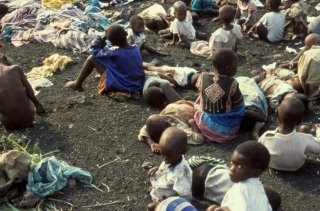 Children in a Congo Refugee Camp
Children in a Congo Refugee CampImage by F. Loock, © UNESCO
Read Annette Hartenstein's complete Highlight for the Americans for UNESCO website.
Traditionally considered too hot for a global institution to handle, the issue of international migration has recently been moving up the UN agenda. Pierre Sané, Assistant Director-General for Social and Human Sciences (SHS), discusses this issue in the September edition of the SHS Views from the perspective of a complex cross-cutting issue that Social and Human Sciences can address.
UNESCO's program on Migration has five main lines of action:
• Increasing the protection of migrants through participation with the International Organization for Migration (IOM), the International Labour Organization (ILO), the Office of the High Commissioner for Human Rights (OHCHR), as well as several NGOs, in an international campaign to encourage States to adhere to the International Convention on the Protection of the Rights of All Migrant Workers and Members of Their Families;
• Improving national policies of the sending, transit and receiving countries, through promoting research and providing training for policy makers so that there is better management of the impact that migration has on societies;
• Promoting the value of and respect for cultural diversity in multicultural societies and improving the balance between policies that favor diversity and those that favor social integration, by developing initiatives that advocate consideration of the Declaration on the Rights of Persons Belonging to National or Ethnic, Religious and Linguistic Minorities (1992), and the UNESCO Universal Declaration on Cultural Diversity;
• Supporting capacity-building, permanence and effectiveness of migrants’ networks as a means of promoting intellectual contribution – as against the current brain drain – through the use of new information and communication technologies; and
• Contributing to the global fight against human trafficking and the exploitation of migrants.

